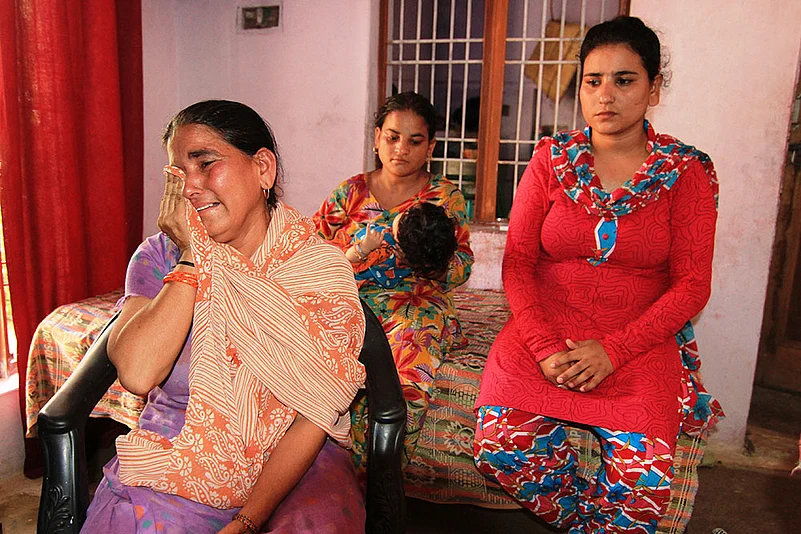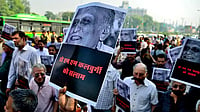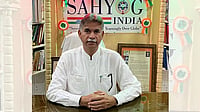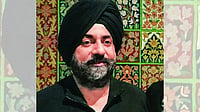Is Kulbhushan Yadav alias Hussein Mubarak Patel an Indian spy held in Pakistan? Or is he a former Indian navy officer who took premature retirement, set up a business in Iran, and was ‘abducted’ by the ISI to strengthen its allegation of an ‘Indian hand’ in its troubles in Balochistan? As Yadav’s alleged confession on camera is debated hotly, with Indian agencies denying any connection with him, many former Indian ‘spies’ say they are not surprised. Giving their own example, they say spies who get caught are routinely disowned by their recruiting agencies.
Possibly the two exceptions, they say, were Sarabjit Singh and Chamel Singh. A film on Sarabjit, who died in 2013 after being attacked by other inmates at the Kot Lakhpat jail in Lahore, is due for release this year, and Narendra Modi had made Chamel Singh’s death, in the same jail, an issue during his 2014 election campaign. At the ‘lalkar rally’ in Jammu, he had highlighted how the the death of Sarabjit had got media attention but that of Jammu native Chamel Singh hadn’t. The BJP had demanded that the UPA government pay his family Rs 1.25 crore in compensation; party MP Avinash Rai Khanna had paid Chamel Singh’s family Rs 3 lakh and sought martyr status for him.
But the lot of spies is the same, whatever party is in government: since Modi was elected prime minister, no one from the BJP has visited the family, Chamel Singh’s widow Kamlesh Devi says. She recounts how he went missing on December 22, 2008. Eventually, the family, which lives barely three kilometres from the international border, received a letter from him. He is said to have died on January 15, 2013, and his battered body was handed over to the Indian authorities after 57 days. His son Deepak, aged 22, says, “In J&K, the government has a rehabilitation policy for surrendered militants as well as youths who throw stones at security forces, raising anti-India slogans. But it doesn’t recognise the sacrifices of people like my father.”

Harbans Lal, 65
Claims to have acted as a guide to several younger boys who sneaked into Pakistan. In a Pakistani prison he was shown containers with the ashes of Indian spies who died there. He now suffers a deep sense of betrayal and says he feels like slitting his veins with a razor.
Anonymity is par for the course in espionage: spies seldom receive gallantry awards or gun-salutes. But governments elsewhere are known to compensate spies adequately for the risk and trouble. The story in J&K is different. Poor, barely educated locals, recruited for their knowledge of the region, its language and its customs, are pushed into spying, often with a few thousand rupees and patriotic fervour as inducement. When caught, the state blandly rejects them—and it hurts.
With India and Pakistan, spy stories—including denials and tit-for-tat actions—play out along parallel lines. Soon after Sarabjeet Singh and Chamel Singh were beaten to death in Kot Lakhpat, a repeat played out at the Kot Bhalwal jail in Jammu. A former soldier convicted for murder killed Sanaullah Haq, a Pakistani imprisoned for “spying and subversive activities”, in a retaliatory attack. “I felt sad about Sanaullah,” says Vinod Sawni, who had rushed to the hospital to enquire about him. Sawni is a former Indian spy, who now runs the Desh Premi Fast Food Corner near Jammu bus stand and is president of the Jammu Ex-Sleuths Association, which works for the welfare of former Indian spies and their families. “People like us are but pawns,” he philosophises. He has recently completed a book on the work he did spying for India in Pakistan and his days in jail. He is looking for a publisher.

Swarn Lal, 53
He claims to have illegally crossed over to Pakistan 120 times on behalf of intel agencies. Says he has spent 15 years in Pakistani prisons, and complains that relatives and police are conniving to grab his house by framing him in false cases and describing him as a Pakistani.
He claims to have illegally crossed over to Pakistan 120 times on behalf of intel agencies. Says he has spent 15 years in Pakistani prisons, and complains that relatives and police are conniving to grab his house by framing him in false cases and describing him as a Pakistani.
“It’s usually semi-literate or unlettered youth who get sucked into spying, driven by acute poverty at home and romantic ideas of patriotism. When they get recruited, they are generally promised a good deal. If perchance they get caught, the agencies disown them, declaring them trespassers, illegal entrants, smugglers and fishermen,” he says. And indeed, smugglers and fishermen (especially in regions like Kutch and the Gujarat coast) are coopted into espionage by agencies on both sides. Some are blackmailed into it.

Vinod Sawni 66
Operating a fast food counter at the Jammu bus stand, he claims to be president of an association of former spies who worked for Indian agencies. He has written a book on the time he spent in Pakistani prisons and is looking for a publisher. “We are but pawns,” he says.
Sawni says he was a 22-year-old taxi-driver when he was lured by the BSF’s intelligence wing. “My local guide in Pakistan, who I suspect was a double agent, betrayed me. After serving a 12-year jail term, I returned in March 1988 during an exchange of prisoners,” he says. “Getting on with life was not easy. It took 20 years to set up a small kiosk for a living. But this too was demolished by the Jammu Municipal Corporation last year. I observed a fast-until-death for 18 days and eventually the divisional commissioner ordered the civic body to reconstruct my shop at the same site.”
Sawni was lucky. Many of the spies tortured in Pakistani prisons have returned as physical and mental wrecks. Raj Kumar of R.S. Pura has no recollection whatsoever of his past--of being a spy, being caught, jailed and returning to India. Living now with his family at their house, which is near a cremation ground, he just keeps staring at the bodies being brought there to be burned. His sister Kanta Devi speaks of how the family had taken him for dead for a long time and had his last rites performed.
Swarn Lal, 53, claims to have illegally crossed to Pakistan to spy for India’s Research & Analysis Wing (RAW) no less than 120 times. “My job was to take pictures of certain places and send them to the agency,” he says. “My recruiter was a distant relative. He knew I had a penchant for spy novels and was very patriotic. By the time I came back, he had retired and advised me to remain silent... My wife had to sell vegetables on the streets to run the family when I was in jail.”

Lahore The Kot Lakhpat jail where Sarabjit was attacked. (photograph by AP)
Prisoners from other countries lodged in Pakistan jails are frequently visited by officials from their embassies to ensure that their basic rights are protected. But Indian officials, he complains, visited him just twice during his stay. He shows a letter dated August 26, 2003, from the Indian High Commission. It’s in response to his request for repatriation, and reads: “...the High Commission has requested the Ministry of Foreign Affairs, Pakistan, to provide you consular access. We hope that they would fix an early date for the purpose and you would be able to return to India soon.” Mouthing an expletive for one of the officials who visited him, Swarn Lal says, “Once, when they came to the jail, three months before my repatriation, I requested one of them to arrage for my release. Do you know what he said? ‘Who asked you to come here?’” He says Jammu police added three years to his misery in a Pakistani jail by sitting on the verification of the documents required for his release. “Intelligence agency officials,” he says, “are never penalised for betraying spies. They get unaccounted money from the government and spend it on luxuries.”
Harbans Lal’s spare but solid frame bespeaks the strength it once bore. “When I was young, I’d carry quintals for miles with ease,” he says. “But the torture has left me incapacitated.” For 13 years, Lal escaped border surveillance and crossed over into Pakistan—some 200 times, he says—to spy for the Indian army. Adopting a dozen Muslim names, he worked deep cover, he claims, and obtained military secrets for the intelligence wing of the Indian army. In an ironic symmetry, he spent 13 years in a Pakistani jail before returning to his village, Bagyal, in Kathau district of Jammu & Kashmir. “I was 30 when I was pushed into Pakistan to spy on military installations, make dead-letter drops and hire Pakistanis to work for our side,” he says, and speaks of gathering intel on helipads, roads, bridges, ammo depots in Lahore, Sialkot, Shakargarh, Narowal, Muridke, Gujranwala, Sheikhpura, Kotla and Multan. Lal says he mentored many young spies and taught them how to operate in Pakistan.
“I was first caught in 1989, but released after four months as I pretended to be a mentally unsound Pakistani,” he recounts. “The second time, I wasn’t lucky. I was tracked down after fellow spies—Baburam, Bhalwan Singh, Swarn Lal, Kuldeep Singh, Om Prakash, Bogal Ram, Kartar Chand, Rajkumar and Billi Gujjar, all from Jammu—were nabbed.” He says the ashes of those who died under torture were put in containers and set on a shelf. His family survived for a few years on the Rs 150 monthly from the army, but this ground to a halt. On his return, he says, he went straight to meet his handlers at the Kalibari army camp, but was denied entry. Letters to higher-ups were all in vain.

Kulbhushan Yadav and his passport showing him as Hussain Mubarak Patel
Intelligence officials, however, speak of exigencies —of having to operate in a shadow world of slippery people. “Most of these people are fully aware of the perils when they go across the border. They are mostly petty smugglers who are aware of the terrain. The new recruits are often sent with someone experienced in this field. Problem arises when they start working as double agents, providing information to intelligence agencies of Pakistan or get blackmailed into double-crossing their own country,” says one. “This practice is a necessary evil and can never be done away with completely as long as Pakistan is our neighbour. The possibilities of injustice with some genuine persons can’t be ruled out. It’s for higher authorities to devise a policy, ensuring some sort of security for spies.”
Usually, when these spies return, they are broken in body and soul after having spent the prime of their lives in the prison of a hostile neighbour and enduring torture during capture and interrogation. It’s another ordeal they face here: poor health, poverty and broken families.
“Actors and cricketers are feted and lionised as national heroes but no one cares for us,” says Krishan Lal Bali, of Lambi Gali, Kathua, who claims to have spent 14 years in various Pakistani jails. After his return, he suffered a paralytic stroke and is cared for by his daughter, who herself lives on little, having left her druggie husband. Bali’s son committed suicide. “What could be more shameful for me than lying like a corpse at my daughter’s home!” he says.
Bali speaks of how, on their first meeting, his recruiter told him that one couldn’t progress in life without taking risks. “He went on to motivate me to work as spy for the country. While speaking to me, he shoved his hand in my pocket and went off immediately, asking me for a next meeting. He had left five 100-rupee notes in my pocket,” he says. But on his return, he says, “Intelligence officers just refused to recognise me. I gave them my code name, to no avail. And as I tried to reason with them, I was manhandled and thrown out. Next day, the police took me into custody and threatened me, saying I must keep silent.”
In Pakistani jail, Bali’s fingernails were pulled out with pliers. “I operated in Sialkot, Sahiwal, Sheikhpura and Lahore. During interrogation at Gora Jail, Sialkote, having tried every method, the interrogating officer threatened me with screwdrivers and pliers. But I didn’t divulge anything, for I’d been promised my family would be taken care of. My nails were pulled out one by one. I endured everything,” he says, breaking into sobs. “Go, tell Modiji I cannot kill myself because I’m paralysed. Tell him what I need is someone to help me die. I’ll be eternally grateful to him and this country.”
***
Cloak & Danger
Sarabjit Singh
- Sarabjit’s family claimed he was a farmer who had strayed across the border in a drunken haze when he was arrested by Pakistan Rangers
- Pakistan’s Supreme Court convicted him for spying and the 1990 Lahore and Faisalabad bombings that killed 14 people
- He was sentenced to death in 1991, but the execution was postponed repeatedly by the Pakistan government
- After 23 years on death row, Sarabjit was lynched by fellow prisoners in Kot Lakhpat jail
Kashmir Singh
- He was freed in 2008 after 35 years in seven jails in Pakistann
- He accused the Indian government of “not spending a penny” on his family after his arrest while on spying duty in Pakistan
- His salary was Rs 400 and, after his arrest, his wife worked as a domestic help to make ends meet
Mohanlal Bhaskar - Mohanlal was arrested in 1968 for spying on Pakistan’s nuclear facilitiesn
- He was, perhaps, betrayed by a double agent, who was also arrested later
- After conviction, he spent six years in various jails in Lahore, Kot Lakhpat, Mianwali and Multan
- He returned to India in 1974 and went on to write about his experiences in An Indian Spy in Pakistan
By Ashutosh Sharma in Jammu


























